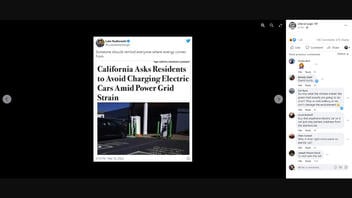
Did California ask electric vehicle owners to avoid charging their cars during a strain on the power grid? Not really: Although the California Independent System Operator (ISO) has encouraged consumers to adjust their electricity usage during a potential power grid strain, the suggestion is not a call to avoid electricity altogether.
The claim appeared in a Facebook post (archived here) published on March 17, 2022. The post featured a screenshot of a tweet. The tweet quoted a headline from a news article that stated "California Asks Residents to Avoid Charging Electric Cars Amid Power Grid Strain." The quote tweet read:
Someone should remind everyone where energy comes from.
This is what the post looked like on Facebook on March 21, 2022:
(Source: Facebook screenshot taken on Mon Mar 21 13:50 2022 UTC)
When California faces a possible strain on its power -- primarily due to high temperatures that motivate residents to use air conditioning units, lights and appliances in the evening en masse -- the California ISO may issue a Flex Alert. Flex Alerts are voluntary calls for consumers to alter their electricity usage to prevent power outages.
In an email to Lead Stories sent on March 18, 2022, Vonette Fontaine, a public information officer for California ISO, told us that the ISO does "encourage" consumers to charge their electric vehicles (EVs) before the beginning of a Flex Alert. But that encouragement is not a call to stop charging their vehicles:
Flex Alerts are voluntary calls for consumer conservation, and the program's messaging emphasizes shifting energy consumption. So we are not asking them to avoid charging altogether, but to charge at different times of the day during a Flex Alert.
In addition, Californians are asked to consider using large appliances and charging anything with a battery (cell phones, laptops, EVs, etc.) early in the day or later at night when it's most optimal for the electricity grid.
Therefore, while the California ISO does "encourage" making changes in their electricity usage, it does not call on consumers to avoid charging electric vehicles altogether, which is what the claim in the Facebook post suggests.
The headline used in the claim is from an article published by Newsmax on June 28, 2021, following extremely high temperatures in California from June 17 to June 18, 2021. More information about the Flex Alerts issued during that time can be found here. At the time of her email, Fontaine told us that there have not been any Flex Alerts issued so far in 2022.


















